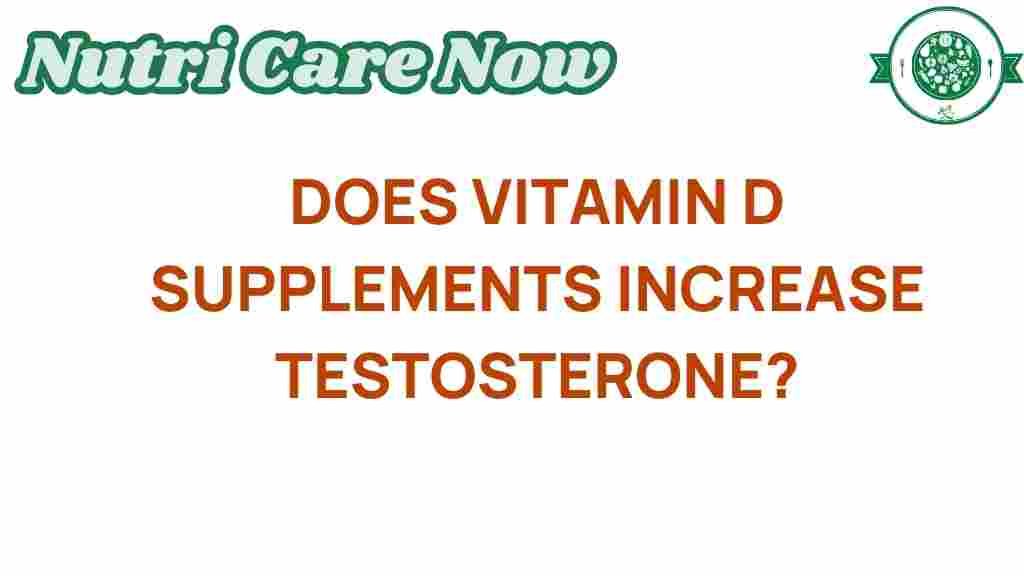Unveiling the Truth: Do Vitamin D Supplements Boost Testosterone Levels?
In the realm of health and wellness, the interplay between hormones and nutrition has become a focal point for many individuals seeking to improve their vitality and overall well-being. One area that has garnered significant attention is the relationship between vitamin D and testosterone. As we delve into this topic, we will explore whether vitamin D supplements can indeed boost testosterone levels, the implications of deficiency, and the current state of research in this area.
The Importance of Vitamin D
Vitamin D is a fat-soluble vitamin essential for numerous bodily functions. It plays a crucial role in maintaining bone health, supporting immune function, and regulating inflammation. Additionally, emerging research has suggested a potential link between vitamin D levels and hormonal balance, particularly testosterone.
Understanding Testosterone
Testosterone is a vital hormone in both men and women, though it is often associated more with men. It is responsible for the development of male physical characteristics, libido, muscle mass, and bone density. Healthy testosterone levels are essential for overall health and well-being.
The Link Between Vitamin D and Testosterone
Several studies have examined the correlation between vitamin D levels and testosterone. The findings suggest that low levels of vitamin D may be associated with lower testosterone levels. Here are some key points to consider:
- Research indicates that men with deficiency in vitamin D often exhibit lower testosterone levels.
- Some clinical trials have shown that vitamin D supplementation can lead to an increase in testosterone levels.
- Vitamin D is thought to influence testosterone production by acting on receptors in the testes.
Research Findings on Vitamin D and Testosterone
Numerous studies have investigated the relationship between vitamin D supplementation and testosterone levels. Here’s a closer look at some notable findings:
Significant Studies
1. **A 2011 study** published in the journal *Hormone and Metabolic Research* found that men with low vitamin D levels had significantly lower testosterone levels compared to those with adequate levels.
2. **A 2016 study** in *The Journal of Clinical Endocrinology & Metabolism* demonstrated that participants who received vitamin D supplements showed a notable increase in their testosterone levels over a year.
3. **A meta-analysis** conducted in 2019 reviewed multiple studies and concluded that vitamin D supplementation does have a positive effect on testosterone levels, particularly in those with deficiency.
How Vitamin D Supplements May Work
The mechanism by which vitamin D might influence testosterone production is still under investigation. However, here are a few hypotheses:
- Testicular Function: Vitamin D receptors are present in the testes, suggesting that vitamin D plays a role in testosterone synthesis.
- Calcium Regulation: Vitamin D helps regulate calcium levels, which are crucial for many bodily functions, including hormone production.
- Reduced Inflammation: Vitamin D has anti-inflammatory properties, which might indirectly support hormone production.
Step-by-Step Guide to Supplementing Vitamin D
If you’re considering taking vitamin D supplements to potentially boost your testosterone levels, follow this step-by-step guide:
Step 1: Get Tested
Before starting any supplementation, it’s essential to know your current vitamin D levels. Consult with a healthcare provider to get a blood test done.
Step 2: Choose the Right Supplement
There are two primary forms of vitamin D supplements:
- Vitamin D2 (ergocalciferol): Generally derived from yeast and fungi.
- Vitamin D3 (cholecalciferol): Derived from animal sources, it’s more effective in raising blood levels of vitamin D.
Step 3: Determine the Dosage
The recommended dietary allowance (RDA) for vitamin D varies based on age, sex, and health status. A healthcare provider can help you determine the appropriate dosage, especially if you have deficiency.
Step 4: Monitor Your Progress
After starting supplementation, it’s important to monitor your levels periodically. Follow up with your healthcare provider to assess whether your testosterone levels improve and to adjust your dosage as needed.
Step 5: Combine with a Healthy Lifestyle
For the best results, combine vitamin D supplementation with a healthy lifestyle that includes:
- A balanced diet rich in nutrients.
- Regular exercise to enhance hormone levels.
- Quality sleep to support overall hormonal health.
Troubleshooting Tips for Vitamin D Supplementation
While vitamin D supplements can be beneficial, some individuals may experience challenges. Here are some troubleshooting tips:
1. Side Effects
Some people may experience side effects from vitamin D supplements, such as nausea or gastrointestinal discomfort. If this occurs, consult your healthcare provider.
2. Ineffectiveness
If you find that your testosterone levels haven’t improved after supplementing, consider the following:
- Check for other underlying health issues that may affect testosterone production.
- Ensure that you are taking the right dosage and form of vitamin D.
- Evaluate your overall lifestyle, including diet and exercise habits.
3. Interaction with Medications
Some medications may interact with vitamin D supplements. Always discuss your current medications with your healthcare provider before starting a new supplement regimen.
Conclusion
The relationship between vitamin D and testosterone is a compelling area of research that continues to unfold. While there is evidence suggesting that vitamin D supplementation may boost testosterone levels, particularly in those with deficiency, individual results can vary. It is crucial to approach supplementation thoughtfully and in conjunction with a healthy lifestyle.
As with any health-related decision, consulting with a healthcare professional is the best course of action. For further reading on hormones and nutrition, check out this comprehensive guide. If you’re interested in scientific studies, you may also want to look at this research article on vitamin D and testosterone.
Ultimately, achieving optimal health and wellness involves a holistic approach that encompasses nutrition, exercise, and proper hormonal balance. By understanding the role of vitamin D in our bodies, we can take informed steps towards improving our health and vitality.
This article is in the category Supplements and created by NutriCareNow Team
